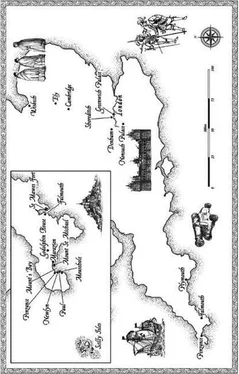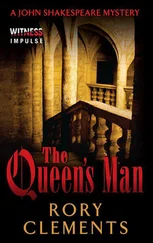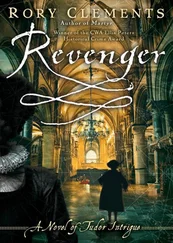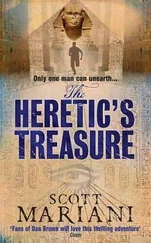Rory Clements - The Heretics
Здесь есть возможность читать онлайн «Rory Clements - The Heretics» весь текст электронной книги совершенно бесплатно (целиком полную версию без сокращений). В некоторых случаях можно слушать аудио, скачать через торрент в формате fb2 и присутствует краткое содержание. Год выпуска: 2013, Издательство: John Murray, Жанр: Исторический детектив, на английском языке. Описание произведения, (предисловие) а так же отзывы посетителей доступны на портале библиотеки ЛибКат.
- Название:The Heretics
- Автор:
- Издательство:John Murray
- Жанр:
- Год:2013
- ISBN:нет данных
- Рейтинг книги:3 / 5. Голосов: 1
-
Избранное:Добавить в избранное
- Отзывы:
-
Ваша оценка:
- 60
- 1
- 2
- 3
- 4
- 5
The Heretics: краткое содержание, описание и аннотация
Предлагаем к чтению аннотацию, описание, краткое содержание или предисловие (зависит от того, что написал сам автор книги «The Heretics»). Если вы не нашли необходимую информацию о книге — напишите в комментариях, мы постараемся отыскать её.
The Heretics — читать онлайн бесплатно полную книгу (весь текст) целиком
Ниже представлен текст книги, разбитый по страницам. Система сохранения места последней прочитанной страницы, позволяет с удобством читать онлайн бесплатно книгу «The Heretics», без необходимости каждый раз заново искать на чём Вы остановились. Поставьте закладку, и сможете в любой момент перейти на страницу, на которой закончили чтение.
Интервал:
Закладка:
Boltfoot was not far from the Great Stone Gate at the southern end of the bridge when he saw Ovid Sloth. He knew him instantly from his great bulk and his waddling gait as he shuffled westwards in the direction of St Mary Overy, the parish church of Southwark.
Sloth was with another man, who pushed a handcart. They were walking very slowly, away from the crowds, and were easy to follow. Boltfoot stayed fifty yards behind. Sloth did not turn, nor look about him. The cart-man, slender and lean, glanced around constantly. Was that one of the attackers from Falmouth? Boltfoot could not be sure. After the parish church, they turned south into the pleasure gardens around the Rose playhouse.
There were few people about. Almost all had gone to the river bank. It was less easy for Boltfoot to conceal himself here. His instinct was to walk up to the men, hold the muzzle of his caliver to Sloth’s chest and order him to do as he was told. He could either take him across the river to Newgate, as Mr Shakespeare had instructed, or to the nearby Clink; they knew Boltfoot there and would incarcerate Sloth for him until he could be transferred under armed guard. But Boltfoot knew his master too well; he would wish to know where Sloth was heading, whom he was meeting. It was too good an opportunity to pass up. Also, there was the small matter of the man with the handcart; he might be armed.
The two men went into the Rose through the players’ entrance, a double-width doorway that allowed carts to be taken straight in for deliveries. Boltfoot moved forward again, his caliver in his arms, his finger on the trigger. All tiredness was forgotten.
The Rose was a compact, timber-framed building, three storeys high, with a multitude of sides so that it was almost egg shaped. Boltfoot waited two minutes, then lifted the latch of the door by which Sloth had entered.
He walked in slowly, taking care to make no sound as he stepped on the boards, all strewn with fresh sawdust. He heard voices somewhere ahead and there, on the stage, stood Ovid Sloth, gasping for breath and leaning against a pillar. He was with three other men, one of whom Boltfoot recognised as Philip Henslowe, patron of this playhouse and attired in his court finery of gold and green. The cart-man and another man, in a wool jerkin, were holding up neatly hung costumes for Sloth’s approbation. If he nodded, the article of clothing was put into the cart; if he shook his head, it was put aside.
‘And you have not forgot the gilded vizards. .’
Henslowe’s assistant produced a wooden box and lifted the lid. Sloth looked in, pulled out a golden face mask, then nodded and replaced it.
‘They will do well.’
The box was added to the costumes in the cart.
Boltfoot watched in astonishment. What in God’s name was going on here?
He looked at the cart-man again. It was no man, but a boyish young woman. Boltfoot tensed. A thought occurred to him: could that be the woman Master Shakespeare sought?
He watched and waited. When half a dozen costumes — men’s rich doublets, hats, hose, robes and some armour — had been placed in the cart, Sloth pulled out a large drawstring purse from beneath his capacious doublet. He poured some gold coins into his hand, then held them out and let Henslowe count them. Henslowe seemed satisfied and took the money.
Boltfoot marched forward, dragging his left foot through the sawdust, the stock of his caliver held square into his chest. ‘Hold fast. One move, Mr Sloth, and you will die.’
The four people on stage looked at him in shock. Then, like participants in an intricate dance, they began moving apart. The woman trundled the cart sideways. Henslowe and his assistant went wide, then moved forward as though they would encircle Boltfoot. Sloth backed away, towards the shadows beneath the canopy. He was pulling open one of the stage doors used for the players’ dramatic exits and entrances.
Boltfoot recalled his master’s words: If you find Sloth, apprehend him. Haul him to Newgate, preferably alive. Preferably alive. The implication of that was Bring him in dead if all else fails .
Boltfoot pulled the trigger.
Chapter 37
The touchpowder fizzed and smoked, then burnt away. No explosion, no shot. Boltfoot looked at his weapon in dismay and uttered a low oath. This had never happened to him before. It was the poxy tiredness that had caused the error in loading and priming the caliver. He did not have time to reload before they were on him. He slung the gun over his shoulder and drew his cutlass.
Henslowe, unafraid and proud, strode up to him, chest thrust out. ‘I know you. You’re John Shakespeare’s man. What do you think you are doing?’
Boltfoot tried pushing Henslowe aside. He had to catch Sloth. He lurched forward but Henslowe’s hand shot out and grabbed his shoulder.
‘You were trying to shoot the cardinal! Your gun misfired!’
‘I must get him, Mr Henslowe. I beseech you, help me. And that woman-’
‘No, God’s death, I will not help you! You will not pass. Lend me assistance, Fontley! Bring him down.’
Fontley, who had the litheness and lean muscular body of a tumbler, thrust out a long, well-formed leg behind Boltfoot’s knees. With the side of his arm, he pushed backwards against Boltfoot’s chest. Boltfoot’s lost his balance and his legs buckled. He crumpled backwards to the floor of the stage, his weapons clattering beneath him on the oak boards. Fontley leapt on him and pinioned his arms. Although Boltfoot was a strong, experienced fighter, he was encumbered by his caliver and cutlass. Fontley drew a dagger from his belt and held the tip to Boltfoot’s throat. Henslowe stepped forward and eased Boltfoot’s caliver from his shoulder.
‘I think you have a great deal of explaining to do.’
‘Let me up. I must catch Sloth-’
‘You are going nowhere. Talk.’
‘First hold Sloth, then I will explain all.’
‘The cardinal has gone. What is this about?’
Boltfoot groaned in desperation. ‘I am Boltfoot Cooper, here on behalf of Mr Shakespeare. This is Queen’s business, Mr Henslowe. Ovid Sloth is a wanted man. I have been hunting him and followed him here. I beg of you, hold him.’
‘The cardinal wanted? Wanted for what, may I ask?’
‘He escaped. I was escorting him to be examined by Sir Robert Cecil and the Council. He escaped at Falmouth.’
‘But what has he done? Why were you holding him?’
‘He was freed by the Spaniards.’ Boltfoot was struggling to think how to explain this. He realised he was making little sense.
‘Well, Mr Cooper, you will have to be a great deal more convincing than that. Cardinal Quick is an old acquaintance of mine and has invested a great deal of money in the Rose and various other playhouse ventures. You cannot just go shooting at unarmed men, especially not respectable merchants like Mr Sloth. I fear you will have to answer for your actions in a court of law.’
Boltfoot fought to raise his head. There was no sign of Ovid Sloth, nor of his female companion with the cart. In the distance, he could hear the sound of trumpets blaring and guns being fired as the royal river procession passed through the dangerous narrows of London Bridge. A great cheer rose up.
Boltfoot was shut away in a dark props cupboard, which gave him little room to move and no hope of escape. He found what he took to be a pennant, which he rolled into a pillow. Like a cat, he curled up on the floor, placed his head on the flag and fell asleep. He was woken in the late afternoon by the opening of the door.
Henslowe was there, with the constable. Boltfoot began to repeat his plea that he was on the side of the law and that he was no threat. More than that, he had been grievously injured by those who had assisted in Sloth’s escape.
Читать дальшеИнтервал:
Закладка:
Похожие книги на «The Heretics»
Представляем Вашему вниманию похожие книги на «The Heretics» списком для выбора. Мы отобрали схожую по названию и смыслу литературу в надежде предоставить читателям больше вариантов отыскать новые, интересные, ещё непрочитанные произведения.
Обсуждение, отзывы о книге «The Heretics» и просто собственные мнения читателей. Оставьте ваши комментарии, напишите, что Вы думаете о произведении, его смысле или главных героях. Укажите что конкретно понравилось, а что нет, и почему Вы так считаете.












